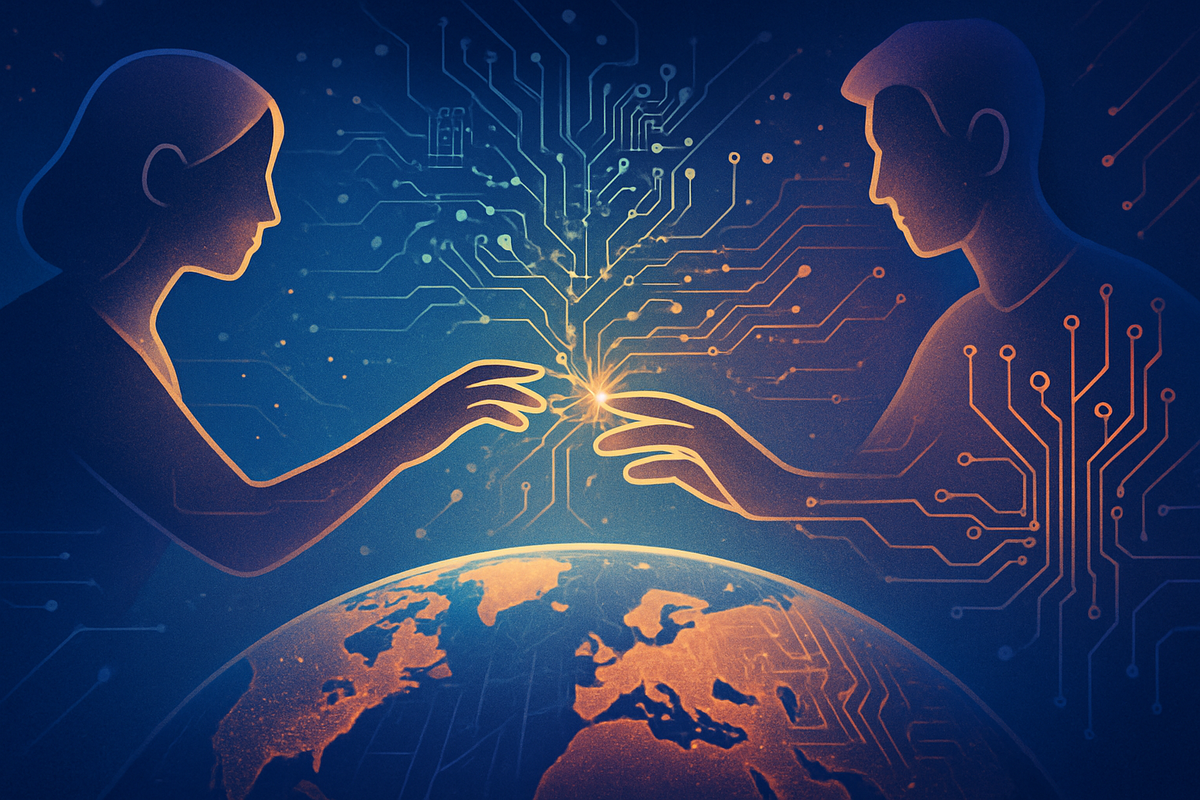
AI technology is rapidly transforming long-distance relationships (LDRs), offering innovative solutions to bridge geographical divides and foster emotional intimacy. From enhanced communication platforms to virtual shared experiences and AI-powered relationship coaches, these advancements are making LDRs more manageable and fulfilling. However, the integration of AI also brings immediate implications, including potential challenges related to the nuances of human connection, privacy concerns, and the inherent limitations in replicating physical intimacy. The market is witnessing a surge in companies developing AI-driven tools aimed at enhancing personal connections, signaling a significant shift in how individuals maintain relationships across distances.
The AI-Powered Evolution of Remote Connection
The application of AI in long-distance relationships has seen a rapid evolution, moving beyond basic video calls to sophisticated tools that create immersive and emotionally resonant experiences. At the core of these advancements are AI-powered communication platforms that not only enhance audio and video quality but also offer real-time translation, bridging linguistic barriers for international couples. These platforms, often leveraging Natural Language Processing (NLP) algorithms, can even suggest conversation starters, ensuring sustained engagement.
A significant leap has been made in Virtual Reality (VR) and Augmented Reality (AR) experiences. AI-driven VR platforms, such as vTime XR, allow couples to "meet" in virtual environments, transforming mundane video calls into shared experiences like virtual date nights on a beach or exploring a 3D space together. AR applications further enhance real-world interactions by overlaying digital elements, enabling partners to send virtual hugs or play interactive AR games, fostering a playful sense of presence. The timeline of these developments has accelerated dramatically, with the rise of advanced conversational AI models like OpenAI's (NASDAQ: MSFT) GPT-3 in 2020 and GPT-4 in 2023, making human-like interactions with AI feel increasingly natural. The approval of the European Parliament's AI Act in March 2024 also marked a crucial step in establishing a regulatory framework for these rapidly evolving technologies.
Key players in this burgeoning sector include AI companion developers like Replika, Otherhalf.ai, and Nomi, which offer AI chatbots designed to provide emotional support and companionship with personalized responses. Relationship enhancement platforms such as Flamme AI and Regain AI (powered by BetterHelp) leverage machine learning to provide personalized relationship coaching, communication analysis, and advice. Furthermore, AI content creation tools from companies like ReelMind.ai and OpenAI (NASDAQ: MSFT) are enabling couples to generate personalized video messages, animated memories, and interactive narratives, creating new avenues for shared experiences. Large tech companies like Google (NASDAQ: GOOGL) and Amazon (NASDAQ: AMZN) are also contributing through their foundational AI research, smart home devices, and voice-activated assistants, which indirectly support LDRs by facilitating daily planning and reminders. The continuous innovation in these areas underscores a broader trend towards leveraging AI to foster deeper and more engaging personal connections.
Market Movers: Who Wins and Who Adapts?
The increasing integration of AI into long-distance relationships is creating a clear divide between potential market winners and those facing significant transformation. Companies at the forefront of AI development and application are poised for substantial gains.
Potential Winners: Major AI and technology platforms are exceptionally well-positioned. Companies like Meta Platforms (NASDAQ: META) are actively exploring AI for social interaction, including AI dating assistants for Facebook Dating and celebrity-partnered AI profiles on Instagram. Their substantial investments in AI infrastructure and AI-driven ad tools are expected to drive increased user engagement across platforms like WhatsApp and Messenger, leading to more data for AI training and personalized content. Similarly, Alphabet (NASDAQ: GOOGL) through its DeepMind AI division and foundational AI models like Gemini, is critical for developing sophisticated AI companions and communication tools. Increased AI usage in relationships will fuel demand for Google Cloud's AI services. Microsoft (NASDAQ: MSFT), a major investor in OpenAI, leverages its Azure cloud platform to provide infrastructure for countless AI services. As AI companions and enhanced communication tools proliferate, demand for robust, scalable cloud AI services will grow, significantly benefiting Microsoft's cloud segment. NVIDIA (NASDAQ: NVDA), as the leading provider of GPUs essential for training and running complex AI models, stands to gain immensely. The development of advanced AI for relationships, VR date nights, and immersive digital experiences will require substantial computational power, directly boosting demand for NVIDIA's hardware.
Dating app companies such as Match Group (NASDAQ: MTCH) and Bumble Inc. (NASDAQ: BMBL) are also positioned to win by integrating AI. AI can revolutionize online dating by improving matchmaking efficiency through advanced algorithms, offering personalized conversation prompts, and even virtual assistants. This could lead to increased user engagement, higher satisfaction, and potentially more paying subscribers for premium AI-driven features. While both companies have faced historical challenges with paying user growth, aggressive AI integration could help them regain momentum and attract new users willing to pay for better-matched and more fulfilling digital interactions.
Telecommunication companies like AT&T (NYSE: T), Deutsche Telekom (OTCMKTS: DTEGY), and SK Telecom (NYSE: SKM) are indirect beneficiaries. They provide the essential network infrastructure for long-distance communication. Increased reliance on AI-powered video calls, VR experiences, and constant digital interaction will drive demand for higher bandwidth, lower latency, and more reliable mobile and internet services. The Global Telco AI Alliance, comprising several major telecom players, is even working on a telco-specific Large Language Model (LLM) to improve services for their combined 1.3 billion subscribers.
Potential Losers or Companies Facing Transformation: The impact on traditional industries like travel and hospitality, and physical gifting, is more nuanced, requiring significant adaptation rather than outright loss. Companies like Expedia (NASDAQ: EXPE) and Booking Holdings (NASDAQ: BKNG), along with major airlines and hotel chains, could see a subtle reduction in the perceived urgency of physical travel for some couples if virtual intimacy becomes highly fulfilling. However, these industries are also rapidly adopting AI to enhance customer experience, personalize itineraries, and streamline booking processes, potentially stimulating different kinds of travel. Their ability to integrate AI for hyper-personalization and efficient operations will determine their success.
Similarly, the traditional physical gifting industry, including companies like Hallmark, might see a shift in gifting habits. If digital, AI-crafted messages or virtual experiences become more central to expressing affection across distances, the demand for traditional physical gifts could see a minor dip. However, AI is also transforming the online gifting industry, making it easier to find personalized gifts through AI-powered recommendation tools. Retailers and gifting companies that do not embrace AI for personalization and convenience in their online offerings might struggle, while those that successfully use AI to enhance the gift-giving experience, whether through better recommendations, personalized messages with physical gifts, or even innovative digital gifts, could thrive. The ultimate stock performance across these sectors will depend on each company's agility in adapting to and leveraging AI innovations.
A Broader Perspective: Trends, Regulations, and History
The burgeoning application of AI in long-distance relationships is not an isolated phenomenon but rather a vivid reflection of several broader industry trends. Foremost among these is the drive towards hyper-personalization, where generative AI is transforming communication by enabling tailored content creation and individualized interactions. This extends to LDRs, where AI can assist in crafting thoughtful messages, suggesting virtual date ideas, or generating personalized video messages that evoke shared memories, effectively bridging the emotional gap created by physical distance. This aligns with a growing demand for AI-based emotional support and mental well-being tools, with platforms like Woebot and Wysa offering AI-driven chatbots for real-time, non-judgmental support, a critical resource for individuals in LDRs grappling with loneliness or stress.
The pervasive integration of AI into existing communication and social media platforms is another key trend. AI features are increasingly embedded within video conferencing tools, messaging apps, and shared activity platforms, making long-distance interactions more immersive. The evolution of dating and relationship coaching is also being reshaped, with AI algorithms analyzing user behavior and preferences to improve matchmaking and provide relationship guidance. This signifies a fundamental shift towards AI as a significant aid in relationship maintenance.
The ripple effects of this trend are substantial. Dating and social media platforms, including Match Group (NASDAQ: MTCH), Bumble Inc. (NASDAQ: BMBL), Meta Platforms (NASDAQ: META), and TikTok, will likely expand their AI features to specifically cater to LDRs, offering advanced communication tools and virtual shared experiences. Communication technology providers will find new opportunities for partnerships, with AI enhancing real-time language translation and personalizing communication. The mental health and wellness app sector will see increased specialization for LDR challenges, fostering collaborations between relationship tech companies and mental health providers. New entrants and niche markets will also emerge, offering highly specialized AI tools for LDRs. However, the potential for misuse of AI, such as deepfakes and emotional manipulation, also creates a demand for companies offering AI ethics auditing and data security solutions.
Regulatory implications are complex and pressing. AI systems in relationships collect highly sensitive personal data, raising critical concerns about data privacy and security. Regulators face the challenge of ensuring transparent, revocable consent mechanisms and robust data governance frameworks to mitigate risks like data misuse. Ethical AI use and bias are also significant concerns, as AI systems can perpetuate biases, leading to unfair outcomes. The potential for manipulation and deception through generative AI's ability to create realistic fake content necessitates frameworks addressing liability for AI-induced harm and mandating disclosure when AI is involved in interactions. Furthermore, the emergence of intimate human-AI relationships raises concerns about emotional dependency and the disruption of human-human social dynamics, prompting a need for guidelines that emphasize transparency about AI's limitations and promote user well-being. The rapid pace of AI advancement often outstrips existing legal frameworks, highlighting the need for regulatory agility and global cooperation.
Historically, technology has consistently reshaped human connection. The invention of the telephone in 1876 by Alexander Graham Bell revolutionized long-distance communication, diminishing geographic barriers but also sparking concerns about over-reliance on calls over face-to-face interactions. The internet, from its inception with ARPANET to the World Wide Web, fundamentally transformed communication, making it instant and globally accessible through email and instant messaging. More recently, social media platforms like MySpace, Facebook, and Instagram further revolutionized social interactions, enabling people to connect and maintain intimacy across distances. While facilitating connections, social media also introduced challenges such as privacy concerns and the potential for diluted, less intentional correspondence. AI's role in LDRs is thus a natural progression in humanity's ongoing quest to overcome physical distance in human connection, offering immense potential while simultaneously introducing new ethical, privacy, and societal challenges.
The Road Ahead: Opportunities and Challenges
The trajectory of AI in long-distance relationships promises a future where technology plays an even more integral role in fostering connection, though it also presents a landscape of strategic pivots and emerging challenges. In the short term, we can expect continued refinement of existing AI applications. Enhanced communication platforms will offer superior audio-visual quality, real-time translation, and sentiment analysis, providing deeper insights into a partner's emotional state. AI-powered virtual assistants and relationship coaches, such as Flamme AI, will become more sophisticated, offering tailored advice, conversation starters, and seamless management of shared calendars and optimal contact times across time zones. The proliferation of shared digital experiences through immersive VR technologies and AI-generated personalized stories or video narratives, like those from ReelMind.ai, will also continue to grow, allowing couples to "experience" moments together despite physical separation. Emotional support chatbots like Replika will further evolve to offer more nuanced companionship, advice, and empathetic responses, helping to manage loneliness and stress.
Looking further ahead, the long-term possibilities are even more transformative. Advanced VR and AR, combined with AI, could create hyper-realistic shared experiences, potentially incorporating advanced haptic feedback systems to simulate touch across distances or holographic communications for truly immersive interactions. Highly sophisticated AI companions could offer personalized relationships, adapting to individual preferences and even specific behaviors, providing consistent availability and non-judgmental support that might seem "easier" than human-human interactions. Predictive relationship analytics might offer insights into long-term compatibility or mediate conflicts with neutral, data-backed advice. The deeper integration of emotional AI will lead to more nuanced and empathetic interactions, helping partners interpret non-verbal cues often missed in digital communication.
These advancements necessitate significant strategic pivots for both individuals and technology providers. Robust ethical frameworks are crucial to address concerns like data privacy, potential manipulation, and the impact on human relationships. The industry must prioritize balancing AI with genuine human connection, ensuring AI acts as a complement rather than a replacement. User education and transparency about AI's capabilities and limitations are paramount to setting realistic expectations. For companies, personalization and customization of AI tools will be key to fitting the unique dynamics of diverse relationships. Addressing the psychological impacts, such as potential over-reliance on AI or the development of unrealistic expectations for human relationships, will also be critical.
Market opportunities are substantial, with the global long-distance couples app market projected to reach USD 4.42 billion by 2034. This opens avenues for subscription models offering premium features, AI-powered content creation platforms, and integrated wellness and mental health support within LDR apps. However, challenges include pervasive privacy and data security concerns, ethical acceptance and trust issues, and the inherent technological limitations of AI, particularly its inability to replicate physical intimacy. The risk of dependency, de-humanization, and even harmful advice from AI companions also poses significant hurdles.
Potential scenarios range from a positive outcome of enhanced connection and resilience, where AI tools seamlessly support strong emotional bonds, to a negative outcome of increased isolation and unrealistic expectations, where individuals become overly reliant on AI. A risky scenario involves the commodification and manipulation of love through customizable AI partners, leading to exploitation or cybercrimes. The most transformative outcome could be hybrid relationships and evolving social norms, where society adapts to new forms of relationships that include both human and AI elements, guided by ethical guidelines and educational initiatives to foster healthier connections. The future of AI in LDRs hinges on thoughtful development, implementation, and adoption, ensuring it genuinely enhances human love rather than diminishing it.
The Future of Connection: A Market Minute Wrap-Up
The integration of AI into long-distance relationships marks a pivotal moment in human connection, offering a compelling blend of innovation and introspection. The key takeaway is that AI is fundamentally reshaping how individuals maintain intimacy across geographical divides, providing sophisticated tools for enhanced communication, emotional support, relationship management, and shared virtual experiences. From real-time translation and sentiment analysis to AI-powered virtual date nights and personalized content creation, the benefits are undeniable in bridging the emotional and physical gaps inherent in LDRs.
However, this technological leap comes with significant caveats. AI currently cannot replicate physical intimacy, a crucial aspect of human bonding. There are also inherent risks of misinterpretation, the potential for AI "hallucinations" to provide harmful advice, and the broader psychological implications of fostering intimate relationships with machines. Psychologists warn of the potential for AI to disrupt human bonds, create unrealistic expectations for human partners, and exacerbate social isolation or emotional dependency. Privacy and data security remain paramount concerns, with the risk of personal information being exploited or deepfake technology being used for manipulation.
Moving forward, the market for AI in relationships is experiencing a boom. Companion apps have seen a surge in popularity, and dating apps are rapidly evolving with AI integration for improved matchmaking and relationship assistance. This growth is partly fueled by a global loneliness crisis, with AI stepping in to provide accessible and consistent support. For investors, AI is a "goldmine of opportunity," predicted to contribute significantly to the global economy.
The lasting impact of AI in relationships hinges on ethical design and user education. The challenge lies in ensuring AI serves as a complement to, rather than a replacement for, genuine human connection. The goal should be to free up time and enhance the quality of human interactions, allowing for deeper, more personal engagements that remain irreplaceable. The danger lies in emotional dependence on AI, the erosion of empathy, and the potential for manipulation.
In the coming months, investors should closely watch for companies prioritizing transparent, ethical AI design and robust data privacy, as these will gain user trust and potentially avoid regulatory pitfalls. Advancements in generative AI and Large Language Models (LLMs) that offer more realistic, personalized, and emotionally intelligent interactions will drive user engagement. Integration with VR/AR for immersive shared experiences, niche applications tailored for LDRs, and solutions focusing on mental wellness and support will also be critical areas for growth. Finally, monitoring user demographics and trust, alongside potential mergers and acquisitions, will provide valuable insights into this rapidly evolving market. The "AI romance boom" is a testament to the enduring human desire for connection, and companies that navigate its complexities responsibly and innovatively are positioned for substantial returns.
This content is intended for informational purposes only and is not financial advice




